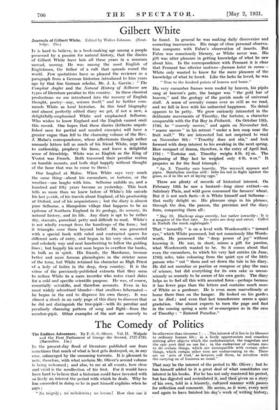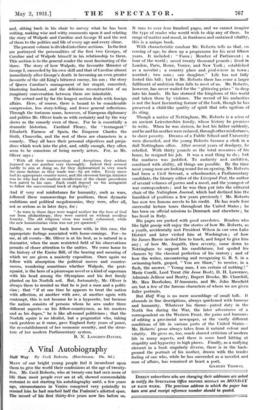The Corned y of Politics
The Endless Adventure. By F. G. G. Oliver. Vol. II. Walpole and the First Parliament of George the Second, 1727-1735. (Macmillan. 15s.) IN the present-day flood of literature published one fears sometimes that much of what is best gets destroyed, or, in any case, submerged by the oncoming torrents. It is pleasant to note, therefore, with what acclaim Mr. Oliver's second volume is being welcomed ; and also, to me at all events, how clear and vivid is the recollection of his first. For it would have been hard to believe. that a historian could have invested with so lively an interest the period with which he deals. Why he has succeeded in doing So he in part himself explains when he
says: •
"No tragedy; no melodrama ; no heroes! How. then can it
be otherwise than tiresome T . . . The interest of it lies in its likeness to ordinary human life ; in a lively opportunism and ceaseless striving after objects which the melodramatist, the tragedian and the epic poet find no use for ; in the endeavour of certain men to do certain things, which are incompatible with certain other things, which certain other men are endeavouring to do. There are no acts of God,' as lawyers call them, to interfere with the carrying on of business as usual."
That may be the interest of the period to Mr. Oliver ; .but he has himself added to it a great deal of what constitutes our interest in his books._ For he has not only mastered his period, but has digested and assimilated it, and then- given wig. story of his Own, told in a leisarely, cultured manner with pauses for reflection and comment. He seeins,, as it were, every now and" again to have finished 'his days work a writing history, and, sitting back in his :chair to- a-urVeY what- he has been writing, making wise and witty comments upon it and relating
the story of Walpole and Caroline and George II and the rest of them to the politics and life of every age and every clime. • The present volume is divided into three sections. In the first are portrayed the personalities of the first two Georges, of Caroline and of Walpole himself in his relationship to them.
This section is to the general reader the most fascinating of the three. The story of how Walpole, the favourite Minister of George I, succeeded by his own skill and that of Caroline almost immediately after George's death in becoming an even greater favourite of the old King's bitterest enemy, his son ; the story of Queen Caroline's management of her stupid, conceited, blustering husband, and the delicious reconstruction of an imaginary conversation between them are inimitable.
The seennd and by far the longest section deals with foreign affairs. Here, of course, there is bound to be considerable compression, less story-telling, and fewer general reflections. Through the tortuous maze, however, of European diplomacy and politics Mr. Oliver leads us with certainty and by the way shows us the comedy even of these. For he is essentially a dramatic historian. Cardinal Fleury, the "termagant" Elisabeth Farnese of Spain, the Emperor. Charles the Sixth, Chauvclin, and the rest of them are characters in a comedy. They all have their personal objectives and preju- dices which work into the plot, and, oddly enough, they often seem to be conscious ef being merely actors. For, as Mr. Oliver says :
"With all their manoeuvrings and deceptions they seldom imposed on one another very thoroughly: Indeed they seemed hardly to aim at doing so, for they diplomatized in very much the same fashion as they made war—by set rules. Every move had its appropriate counter move, and the cleverest foreign minister was he who had the readiest recollection of the classic precedents best suited to his case. Each could depend on his antagonist to follow the conventional track of duplicity."
And if very real misfortunes for humanity, such as wars, followed these manoeuvrings for positions, these dynastic ambitions and political megalomanias, they were, after all, not so serious as in later days, for :
"As wars in those days were waged neither for the love of God nor from philanthropy, they were carried on without needless ferocity. The old religious virus was nearly exhausted, while the new humanitarian virus was not yet spawned."
Finally, we are brought back home with, in this case, the appropriate feelings associated with home-comings. For—to me, at all events—Mr. Oliver is -at his best, as is natural in a dramatist, when the more restricted field of his observations permits of closer attention to -the unities. We come home to the history of the Excise Bill, of the bearing and meaning of which we are given a maAterly exposition. Once again we follow with absorption the political moves and counter- moves, wondering sometimes whether Walpole, the prot- agonist, is the hero of a picaresque novel or a kind of superman with his head among the Olympians and his feet -firmly planted on his Norfolk soil. But, fortunately, Mr. Oliver is always there to remind us that he is just a man and a politi- cian"; - that "if at one time he appears to treat the nation with affection, at another with awe, at another again with contempt, this is not because he is a hypocrite, but because the nation consists of persons whom he sees under three different aspects—as his fellow-countrymen, as his masters and as his dupes," he is like all-round politicians ; that the Norfolk squire is no idealist, but a pragmatist who, taking each problem as it came, gave England forty years of peace, the re-establishment of her economic security, and the struc- ture of her modern Parliamentary system, B. N. LANGDON-DAVIES.





































 Previous page
Previous page